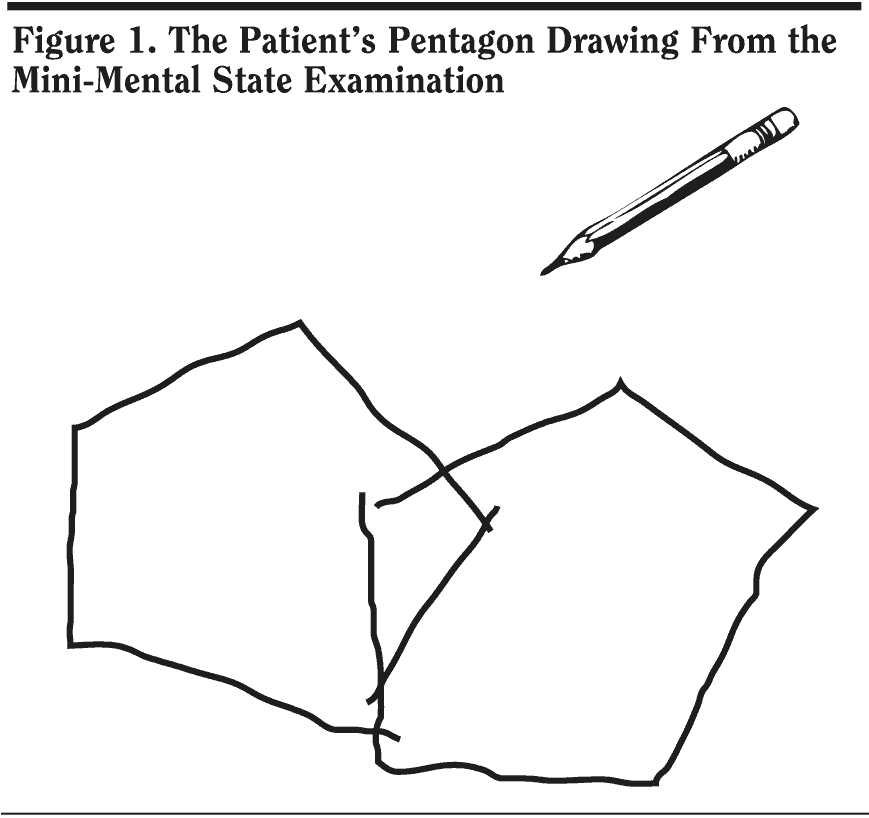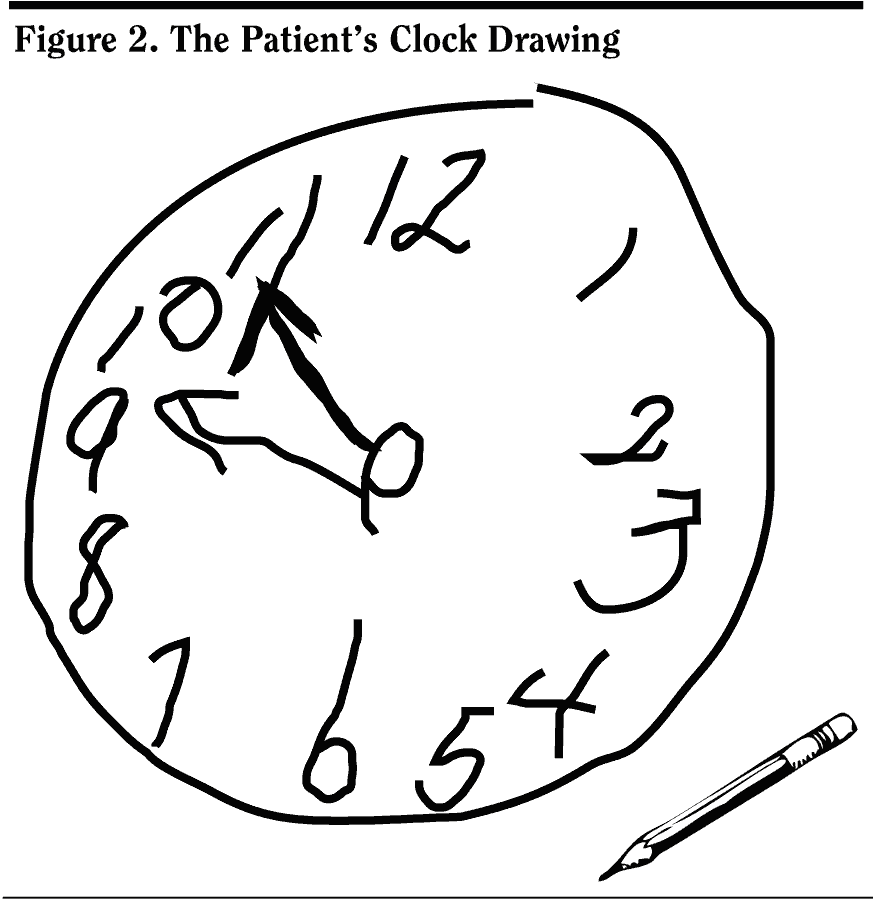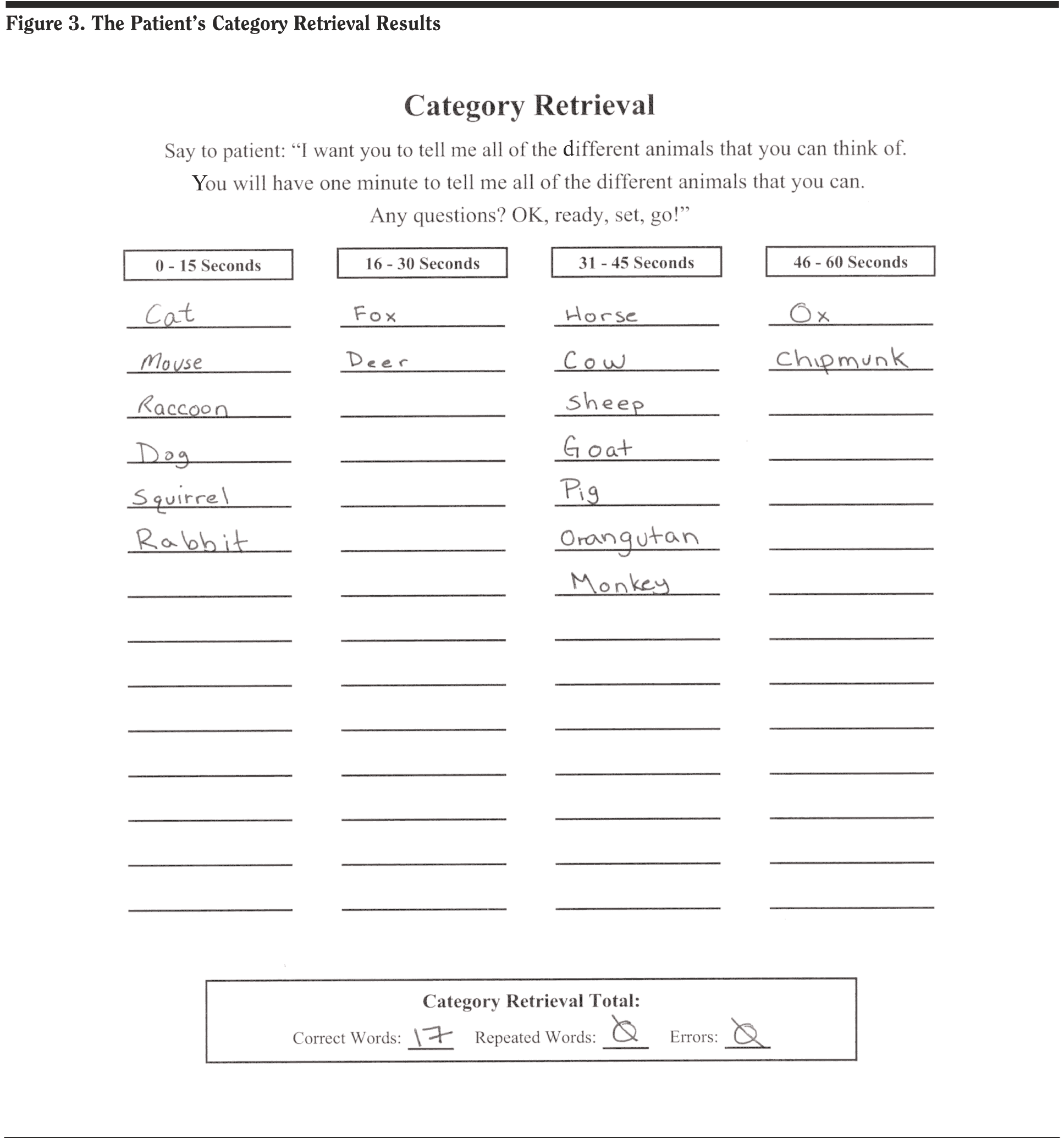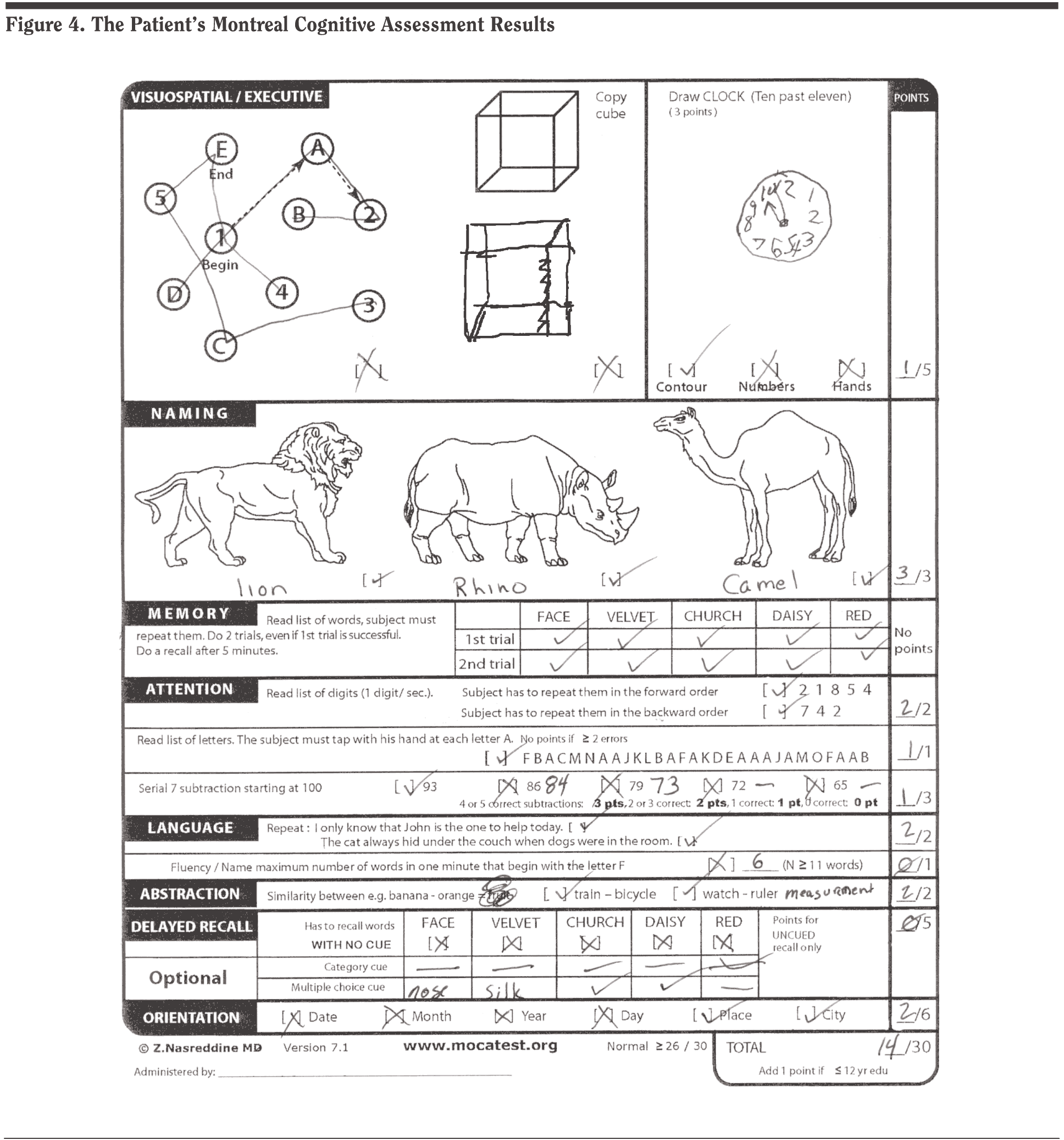Find more articles on this and other psychiatry and CNS topics:
The Journal of Clinical Psychiatry
The Primary Care Companion for CNS Disorders
CASE CONFERENCE
The Banner Alzheimer’s Institute Case Conference is a weekly event in which physicians and staff discuss challenging and/or teaching cases of patients seen at the Institute’s Memory Disorders Clinic. These conferences are attended by a multidisciplinary group that includes Banner Alzheimer’s Institute dementia specialists, community physicians (internal medicine, family medicine, and radiology), physician assistants, social workers, nurses, medical students, residents, and fellows.
BANNER ALZHEIMER’ S INSTITUTE
The Banner Alzheimer’s Institute located in Phoenix, Arizona, has an unusually ambitious mission: to end Alzheimer’s disease without losing a generation, set a new standard of care for patients and families, and forge a model of collaboration in biomedical research. The Institute provides high-level care and treatment for patients affected by Alzheimer’s disease, dementia, and related disorders. In addition, the Institute offers extensive support services for families and many unique and rewarding research opportunities.
Received: June 21, 2011; accepted June 21, 2011.
Published online: August 25, 2011.
Prim Care Companion CNS Disord 2011;13(4):doi:10.4088/PCC.11alz01241
© Copyright 2011 Physicians Postgraduate Press, Inc.
AUTHORS
Anna Burke, MD, is a geriatric psychiatrist and dementia specialist at the Memory Disorders Clinic of Banner Alzheimer’s Institute.
Roy Yaari, MD, MAS, a neurologist, is associate director of the Memory Disorders Clinic of Banner Alzheimer’s Institute and a clinical professor of neurology at the College of Medicine, University of Arizona, Tucson.
Adam S. Fleisher, MD, MAS, is associate director of Brain Imaging at the Banner Alzheimer’s Institute, a neurologist at the Institute’s Memory Disorders Clinic, and an associate professor in the Department of Neurosciences at the University of California, San Diego.
Helle Brand, PA, is a physician assistant at the Memory Disorders Clinic of Banner Alzheimer’s Institute.
Jan Dougherty, RN, MS, is director of Family and Community Services at Banner Alzheimer’s Institute.
James Seward, PhD, ABPP, is a clinical neuropsychologist at Banner Alzheimer’s Institute.
Pierre N. Tariot, MD, a geriatric psychiatrist, is director of Banner Alzheimer’s Institute and a research professor of psychiatry at the College of Medicine, University of Arizona, Tucson.
Corresponding author: Anna D. Burke, MD, Banner Alzheimer’s Institute, 901 E. Willetta St, Phoenix, AZ 85006 ([email protected]).
Original material is selected for credit designation based on an assessment of the educational needs of CME participants, with the purpose of providing readers with a curriculum of CME activities on a variety of topics from volume to volume. This special series of case reports about dementia was deemed valuable for educational purposes by the Publisher, Editor in Chief, and CME Institute Staff. Activities are planned using a process that links identified needs with desired results.
To obtain credit, read the material and go to PSYCHIATRIST.COM to complete the Posttest and Evaluation online.
CME Objective
After studying this case, you should be able to:
- Diagnose a geriatric patient who reports short-term memory loss with insidious onset and gradual progression over 2 years
Accreditation Statement
The CME Institute of Physicians Postgraduate Press, Inc., is accredited by the Accreditation Council for Continuing Medical Education to provide continuing medical education for physicians.
Credit Designation
The CME Institute of Physicians Postgraduate Press, Inc., designates this journal-based CME activity for a maximum of 1.0 AMA PRA Category 1 Creditâ„¢. Physicians should claim only the credit commensurate with the extent of their participation in the activity.
Date of Original Release/Review
This educational activity is eligible for AMA PRA Category 1 Credit through August 31, 2014. The latest review of this material was August 2011.
Financial Disclosure
All individuals in a position to influence the content of this activity were asked to complete a statement regarding all relevant personal financial relationships between themselves or their spouse/partner and any commercial interest. The CME Institute has resolved any conflicts of interest that were identified. In the past year, Larry Culpepper, MD, MPH, Editor in Chief, has been a consultant for AstraZeneca, Labopharm, Pfizer, and Trovis; has been a member of the speakers/advisory board for Merck; and has held stock in Labopharm. No member of the CME Institute staff reported any relevant personal financial relationships. Faculty financial disclosure appears at the end of the article.
HISTORY OF PRESENT ILLNESS
Ms A, a 69-year-old married woman with no prior neuropsychiatric history, presented with a chief complaint of insidious onset and gradual progression of short-term memory loss noted both by her husband and herself, beginning approximately 24 months prior to her initial evaluation at our clinic. Ms A relied increasingly on copious note taking, which was new for her. She occasionally repeated herself, forgot appointments, and needed reminders. Ms A’s long-term memory was excellent. There were no problems with basic activities of daily living. On detailed questioning, there was minimal evidence of impairment in instrumental activities. Ms A’s husband reported that she now avoided driving on the highways. A detailed review of driving safety revealed an isolated episode of pulling out onto a busy road and being struck by another car. It was not clear what went wrong; there were no injuries. Ms A did not now nor had she ever paid bills. They both felt that she could probably accomplish this task but would not enjoy it.
Both Ms A and her husband noted that she was somewhat more irritable and quick to anger and intermittently tearful. Some of the anger was situational: her husband tended to remind her or finish her sentences when she hesitated, and he was critical of her decision to drive surface streets instead of the highway. Ms A felt that his behavior was intrusive; she also felt upset when these things happened because they served as reminders that there was a problem that she would rather not confront. Some mild anticipatory anxiety was noted as well.
There was no history of seizure, stroke, head trauma, toxin exposure, or abnormal movement. Ms A had not had any previous medical workup of this condition. She had consulted with a homeopathic physician 1 year before, who recommended some homeopathic therapies; however, her symptoms worsened gradually.
PAST MEDICAL HISTORY
Ms A’s past medical history included borderline hypertension, a hysterectomy in 2004, Raynaud’s disease, benign breast calcifications, and low vitamin D levels.
ALLERGIES
Ms A was allergic to iodine compounds.
MEDICATIONS
Ms A’s only prescription medication was olmesartan, which she took inconsistently. She took a long list of nutraceuticals including milk thistle, apoaequorin l-arginine, L-carnitine, vitamin E, vitamin A, coenzyme Q10, Orenda, omega 3 fatty acids, magnesium, and glucosamine. None of the supplements were taken in toxic doses.
HABITS
Ms A consumed small amounts of alcohol, never in excess. There was no other substance use history.
SOCIAL HISTORY
The patient had a college education. She worked briefly as a school teacher and then worked primarily as a homemaker after the birth of the couple’s 3 children. Ms A and her husband spent their summers at their home on the Atlantic coast and their winters in Arizona. They planned to return to their summer home in the next week.
FAMILY HISTORY
Ms A’s father died with a diagnosis of probable Alzheimer’s disease in his 70s after having had symptoms for about 12 years. Her mother died at age 89 years without cognitive problems. There was no other family medical history of note.
Based on the information so far, do you think a dementia is present?
Your colleagues who attended the Banner Alzheimer’s Institute Case Conference answered as follows:
| A. Yes | 10% |
| B. No | 54% |
| C. Not enough information | 36% |
| D. Could be psychiatric | 0% |
Comments from those who chose A
The insidious onset and gradual progression of cognitive changes in addition to copious maintenance of notes and lists indicate a struggle with cognitive impairment. The patient displayed limited changes in functional abilities, noting that her responsibilities at baseline were minimal and routine. Her medication noncompliance and self-limiting of driving may have indicated an actual difficulty performing these tasks.
Comments from those who chose B
No strong evidence of functional impairment is noted. It appears that the patient is able to compensate for her cognitive losses. Hence, at most, mild cognitive impairment is present.
Comments from those who chose C
Not enough information has been provided. The clinicians would like to see the results of additional cognitive testing/neuropsychological evaluations.
The DSM-IV-TR defines dementia as multiple cognitive deficits that include memory impairment and at least 1 of the following cognitive disturbances: aphasia, apraxia, agnosia, or a disturbance in executive functioning. The cognitive deficits must be sufficiently severe to cause impairment in social or occupational functioning and must represent a decline from a previously higher level of functioning. A diagnosis of dementia should not be made if the cognitive deficits occur exclusively during the course of a delirium (American Psychiatric Association, 2000).
Mild cognitive impairment refers to cognitive impairment that does not meet the criteria for normal aging or dementia because the cognitive impairment does not impair activities of daily living. Several criteria for, and subtypes of, mild cognitive impairment have been proposed (Voisin et al, 2003). Originally, mild cognitive impairment emphasized memory impairment as a precursor state for Alzheimer disease (Petersen et al, 1999). It then became apparent that mild cognitive impairment is a heterogeneous entity that affects other cognitive domains and includes the prodromal stages of other dementias. The diagnostic criteria for mild cognitive impairment are not exact and require subjectivity in determining whether a cognitive impairment is present or what constitutes impairment in activities of daily living.
Different dementias may be associated with various physical examination findings. However, most often the physical examination is normal in the early stages. Some subtle general findings can include frontal release signs such as a positive snout, glabellar, or palmomental reflex (Links et al, 2010).
Based on the information so far, what would you expect to see on the neurologic examination?
Your colleagues who attended the Banner Alzheimer’s Institute Case Conference answered as follows:
| A. Normal | 55% |
| B. Objective neurologic findings (including frontal release signs) | 45% |
| C. Nonphysiologic findings (consistent with malingering) | 0% |
Ms A’s general physical and neurologic examinations were normal.
Based on the information so far, what would you expect the MMSE score to be?
Your colleagues who attended the Banner Alzheimer’s Institute Case Conference answered as follows:
| A. 26-30 | 82% |
| B. 21-25 | 18% |
| C. 16-20 | 0% |
| E. 11-15 | 0% |
| F. Lower than 11 | 0% |
Ms A had an MMSE (Folstein et al, 1975) score of 24, with points off in orientation, short-term recall, and certain measures of attention. Her figure copying was intact. Ms A’s pentagon drawing from the MMSE is included in Figure 1. Figures 2 and 3 depict Ms A’s clock drawing and Category Retrieval test results (Mitrushina et al, 2005).
Based on the test scores so far, do you think this is dementia?
Your colleagues who attended the Banner Alzheimer’s Institute Case Conference answered as follows:
| A. Yes | 46% |
| B. No | 54% |
COMMENT
On the basis of the test scores, the clinician who previously stated that there was not enough information now changed his/her mind stating that this was in fact a dementia.
At the conclusion of the first visit, the clinician’s impression was as follows: the patient meets criteria for multidomain mild cognitive impairment. She exhibits mild cognitive changes that are evident often to oneself and typically to others and that often show up on objective assessments of cognitive function. Certainly learning and short-term memory are affected, as well as orientation, possibly attention, and executive function. There may or may not be subtle language changes. Further clarification of the nature of her cognitive strengths and weaknesses and assessment for all possible causes of this cognitive impairment syndrome are indicated.
What should the next step be?
Your colleagues who attended the Banner Alzheimer’s Institute Case Conference answered as follows:
| A. Neuropsychological testing | 0% |
| B. Laboratories (CBC, CMP, TSH, vitamin B12 level) | 0% |
| C. Structural brain scan | 0% |
| D. Genetic testing | 0% |
| E. PET scan | 0% |
| F. B and C | 0% |
| G. A, B, C | 100% |
Does the presentation warrant initiation of a cognitive enhancer like a cholinesterase inhibitor?
Your colleagues who attended the Banner Alzheimer’s Institute Case Conference answered as follows:
| A. Yes | 18% |
| B. No—wait for results of the additional testing | 73% |
| C. Uncertain—would discuss with family | 9% |
PLAN
At the conclusion of this first visit, the clinician’s plan was as follows: laboratory tests (CBC, CMP, TSH, rapid plasma reagin, vitamin B12 level), brain magnetic resonance imaging (MRI), and neuropsychological testing to serve as an objective baseline against which to measure any future change, to provide assistance in differential diagnosis, and to help create a customized adaptive plan according to her pattern of strengths and weaknesses.
FOLLOW-UP
Ms A was seen in the clinic approximately 2 months later. Neuropsychological test results confirmed the presence of a multidomain mild cognitive impairment at that time. On testing, the patient displayed deficits in a variety of cognitive domains, including memory, visual perception, concentration for complex stimuli, and abstract thinking. An MRI of the brain and laboratory studies were unremarkable. Cognitive and functional abilities were largely unchanged. However, Ms A was experiencing some degree of anxiety, fear, anger, and sadness regarding her deficits. Her husband reported that a certain degree of “feistiness” was a baseline behavior for her. After lengthy discussion of the pros and cons of off-label cholinesterase inhibitor use, Ms A opted to try donepezil. She initially tolerated the 5-mg daily dose. The family noted a subjective improvement in short-term memory abilities and concentration, as well as an improvement in anger and frustration tolerance. However, an increase to 10 mg daily resulted in intolerable rhinorrhea and gastrointestinal distress, known side effects of this medication. Ms A was consequently switched to a rivastigmine transdermal patch at 4.6 mg daily, which was titrated up to a dose of 9.5 mg daily. She tolerated the medication well at this dose.
DISCUSSION
Patients with mild cognitive impairment due to Alzheimer’s disease are considered to be in a predementia phase. This degree of cognitive impairment is not normal for the patient’s age. Individuals suffering from mild cognitive impairment have generally preserved functional abilities with little or no impairment in activities of daily living, but may display impairments in a variety of cognitive domains. The high rate of conversion from mild cognitive impairment due to Alzheimer’s disease to dementia due to Alzheimer’s disease makes early diagnosis and treatment important clinical issues. In its earliest stages, Alzheimer’s disease manifests primarily as cognitive impairment. As Alzheimer’s disease progresses from a predementia (mild cognitive impairment) stage to dementia, there is further loss of cognitive abilities, a loss of functional independence, and the development of behavioral problems. Various attempts to acquire earlier therapies that may stave off progression of mild cognitive impairment to Alzheimer’s disease have produced mixed results (Feldman et al, 2007; Salloway et al, 2004; Winblad et al, 2008).
Currently, there is no US Food and Drug Administration (FDA)-approved treatment for mild cognitive impairment. Prior clinical trials of cholinesterase inhibitors yielded primarily negative results, showing either lack of benefit of cholinesterase inhibitors altogether, or lack of benefit on primary outcomes with possible benefit on secondary outcomes (Petersen et al, 2005). For example, Petersen et al (2005) conducted a double-blind study in which 769 subjects were randomly assigned to receive 2,000 IU of vitamin E daily, 10 mg of donepezil daily, or placebo for 3 years. The primary outcome was clinically possible or probable Alzheimer’s disease; secondary outcomes were cognition and function. The rate of progression to Alzheimer’s disease after 3 years was not lower among patients treated with donepezil than among those given placebo, although some secondary outcomes showed results favoring donepezil. Among carriers of 1 or more apolipoprotein E epsilon4 alleles, donepezil therapy was associated with a lower rate of progression to Alzheimer’s disease during the first 12 months of treatment. There were no significant differences in the rate of progression to Alzheimer’s disease between the vitamin E and placebo groups at any point, either among all patients or among apolipoprotein E epsilon4 carriers (Petersen et al, 2005).
Although cholinesterase inhibitors have slightly different pharmacologic properties, they all work by inhibiting the breakdown of acetylcholine, an important neurotransmitter associated with memory, by blocking the enzyme acetylcholinesterase. These medications can temporarily modify the manifestations of dementia due to Alzheimer’s disease. Thirteen randomized, double-blind, placebo-controlled trials of individuals with mild, moderate, or severe dementia due to Alzheimer’s disease using donepezil, galantamine, or rivastigmine at the recommended dose produced improvements in cognitive function (Birks, 2006). The trials ranged in length for periods of 6 months to 1 year. On average, treatment groups displayed an improvement of cognitive function of −2.7 points (95% CI, −3.0 to −2.3) in the midrange of the 70-point Alzheimer’s Disease Assessment Scale-Cognitive subscale. Study clinicians blind to other measures rated global clinical state more positively in treated patients. Benefits of treatment were also seen on measures of activities of daily living and behavior. None of these treatment effects were large. There was also nothing to suggest that the effects varied for patients with severe dementia or mild dementia, although little evidence was available for those suffering from severe dementia. Donepezil is the only cholinesterase inhibitor approved by the FDA for treatment of severe dementia; the n-methyl-d-aspartate (NMDA) receptor antagonist memantine is also approved for treatment of moderate-severe dementia due to Alzheimer’s disease. More adverse events, namely nausea, vomiting, and diarrhea, were noted in the patients treated with cholinesterase inhibitors than with placebo (Birks, 2006).
FOLLOW-UP
One year later, Ms A was again seen in the clinic due to a significant worsening of affective lability, increased irritability, and periods of verbal agitation. The patient denied any depressive mood, decreased interest or motivation, poor energy level, or changes in sleep pattern. Ms A’s husband expressed concern over her current drop in appetite and stated that family members had been prompting her to eat. The family noted significant worsening of short-term memory abilities over the past year, with increased repetition and increasing difficulty remembering recent occurrences. No difficulty with geographic disorientation was noted. Ms A denied any worsening functional deficits. However, she now began to shy away from many previously performed activities such as cooking. During the time of the visit to the clinic, Ms A also underwent additional cognitive screening tests including the MMSE and Montreal Cognitive Assessment (MoCA) (Nasreddine et al, 2005) test.
Based on the information so far, what would you expect the MMSE score to be?
Your colleagues who attended the Banner Alzheimer’s Institute Case Conference answered as follows:
| A. 26-30 | 9% |
| B. 21-25 | 63% |
| C. 16-20 | 18% |
| D. 11-15 | 0% |
| E. Lower than 11 | 0% |
The MMSE score was 17 out of 30, with Ms A losing 6 points on orientation, 2 points on attention and calculation, 1 point on comprehension, 3 points on delayed recall, and 1 point on language.
Based on the information so far, what would you expect the MoCA score to be?
Your colleagues who attended the Banner Alzheimer’s Institute Case Conference answered as follows:
| A. 26-30 | 0% |
| B. 21-25 | 0% |
| C. 16-20 | 9% |
| D. 11-15 | 82% |
| E. Lower than 11 | 9% |
A MoCA test was performed and revealed a total score of 14 out of 30. The patient displayed impairments in executive function and visuospatial abilities as well as delayed recall, attention, orientation, and phonemic fluency (Figure 4).
Based on the information so far, do you think a dementia is present?
Your colleagues who attended the Banner Alzheimer’s Institute Case Conference answered as follows:
| A. Yes | 100% |
| B. No | 0% |
| C. Not enough information | 0% |
| D. Could be psychiatric | 0% |
COMMENT
The clinicians felt that there was clear evidence of impairments of both cognitive abilities and function, which are required to make the diagnosis of a dementia.
Based on the information so far, what is the most likely diagnosis?
Your colleagues who attended the Banner Alzheimer’s Institute Case Conference answered as follows:
| A. Pseudodementia | 0% |
| B. Frontotemporal dementia syndrome | 0% |
| C. Alzheimer’s dementia | 100% |
| D. Mild cognitive impairment | 0% |
| E. Dementia not otherwise specified | 0% |
What would you do next?
Your colleagues who attended the Banner Alzheimer’s Institute Case Conference answered as follows:
| A. Laboratories (CBC, CMP, TSH, vitamin B12) | 0% |
| B. Repeat neuropsychological testing | 0% |
| C. PET scan | 9% |
| D. Initiate an NMDA antagonist | 36% |
| E. Initiate an antidepressant | 36% |
| F. Have patient return to clinic in 6 months | 0% |
| G. D and E | 19% |
| H. Switch to a different cholinesterase inhibitor | 0% |
COMMENT
The majority of the clinicians felt that Ms A had displayed a decline in cognitive functioning warranting the addition of an NMDA antagonist to further slow progression of symptoms. Ms A also displayed prominent depressive and behavioral symptoms, which would prompt consideration of initiation of antidepressant therapy. Many of the clinicians present reported that they would initiate 1 therapy at a time, while closely monitoring for possible side effects and for benefit.
PLAN and follow-up
At the conclusion of the visit, memantine was started at 5 mg/d and was slowly titrated to a final dose of 10 mg twice daily. Citalopram was also initiated at a dose of 10 mg/d to minimize irritability and mood instability. Ms A and her spouse reported that she tolerated the memantine and citalopram well. No significant side effects were noted. Since starting the medication, they noted a subjective improvement in short-term memory abilities as well as functional abilities. Ms A’s mood and her irritability significantly improved. She became more social. Ms A now organized meals without difficulty and continued to operate a motor vehicle without much problem. An additional MMSE was performed.
There is a high prevalence rate (30%-50%) of Alzheimer’s disease and depression comorbidity. Older individuals suffering from depression may not present with typical symptoms consistent with the DSM-IV-TR diagnosis of major depressive disorder. Instead, more prominent irritability, agitated behaviors, and somatic symptoms or somatic preoccupation may be noted. Several screening tools including the Geriatric Depression Scale (Yesavage et al, 1982-1983) and the 9-item Patient Health Questionnaire (Kroenke et al, 2001) may be useful in assessing the presence of depressive symptoms and their progression.
Based on the information so far, what would you expect the MMSE score to be?
Your colleagues who attended the Banner Alzheimer’s Institute Case Conference answered as follows:
| A. 26-30 | 0% |
| B. 21-25 | 27% |
| C. 16-20 | 73% |
| D. 11-15 | 0% |
| E. Lower than 11 | 0% |
Ms A scored 22 out of 30. She was also noted to have a much brighter affect and appeared to be able to focus easily on the conversation at hand.
DISCUSSION
Memantine displayed a small beneficial effect at 6 months in 2 of 3 trials in patients with moderate to severe dementia due to Alzheimer’s disease (McShane et al, 2006). In patients with mild to moderate dementia, a small beneficial effect on cognition was detectable also in only 1 of 3 trials (McShane et al, 2006); hence, the medication carries an FDA indication solely for moderate to severe Alzheimer’s disease dementia (Forest Laboratories, 2007). However, memantine is sometimes considered for off-label use at earlier stages of the illness if patients are unable to tolerate cholinesterase inhibitors or if behavioral symptoms are prominent (Fillit et al, 2010). A 2006 review of double-blind, parallel-group, placebo-controlled, randomized trials of memantine in people with dementia reported a slight decrease in development of agitation in patients taking memantine (McShane et al, 2006; Wilcock et al, 2008). This effect was slightly larger, but still small, in moderate to severe dementia due to Alzheimer’s disease. There was no evidence as to whether memantine had an effect on agitation that is already present. A significant advantage for memantine over placebo was also supported by a pooled analysis of 3 studies of patients with symptoms of aggression/agitation, delusions, and hallucinations (Aboukhatwa et al, 2010).
Disclosure of off-label usage
The authors have determined that, to the best of their knowledge, donepezil and rivastigmine are not approved by the US Food and Drug Administration for the treatment of mild cognitive impairment.
FINANCIAL DISCLOSURE
Dr Yaari is a consultant for Amedisys Home Health. Dr Tariot is a consultant for Acadia, AC Immune, Allergan, Eisai, Epix, Forest, Genentech, MedAvante, Memory Pharmaceuticals, Myriad, Novartis, Sanofi-Aventis, Schering-Plough, and Worldwide Clinical Trials; has received consulting fees and grant/research support from Abbott, AstraZeneca, Avid, Baxter, Bristol-Myers Squibb, GlaxoSmithKline, Elan, Eli Lilly, Medivation, Merck, Pfizer, Toyama, and Wyeth; has received educational fees from Alzheimer’s Foundation of America; has received other research support only from Janssen and GE; has received other research support from National Institute on Aging, National Institute of Mental Health, Alzheimer’s Association, Arizona Department of Health Services, and Institute for Mental Health Research; is a stock shareholder in MedAvante and Adamas; and holds a patent for “Biomarkers of Alzheimer’s Disease.” Drs Burke, Fleisher, and Seward and Mss Brand and Dougherty have no personal affiliations or financial relationships with any commercial interest to disclose relative to the activity.
DISCLAIMER
The opinions expressed are those of the authors, not of Banner Health or Physicians Postgraduate Press.
Clinical Points
- Individuals suffering from mild cognitive impairment have generally preserved functional abilities with little or no impairment in activities of daily living, but may display impairments in a variety of cognitive domains.
- The high rate of conversion from mild cognitive impairment due to Alzheimer’s disease to dementia due to Alzheimer’s disease makes early diagnosis and treatment important clinical issues.
- Currently, there is no US Food and Drug Administration-approved treatment for mild cognitive impairment. Prior clinical trials of cholinesterase inhibitors yielded primarily negative results, showing either lack of benefit of cholinesterase inhibitors altogether or lack of benefit on primary outcomes with possible benefit on secondary outcomes.
- There is a high prevalence (30%-50%) of Alzheimer’s disease and depression comorbidity. Older individuals diagnosed with depression may not present with typical symptoms consistent with the DSM-IV-TR.
This CME activity is expired. For more CME activities, visit cme.psychiatrist.com.
Find more articles on this and other psychiatry and CNS topics:
The Journal of Clinical Psychiatry
The Primary Care Companion for CNS Disorders
References
Aboukhatwa M, Dosanjh L, Luo Y. Antidepressants are a rational complementary therapy for the treatment of Alzheimer’s disease. Mol Neurodegener. 2010;5(1):10. PubMed doi:10.1186/1750-1326-5-10
American Psychiatric Association. Diagnostic and Statistical Manual of Mental Disorders. Fourth Edition, Text Revision. Arlington, VA: American Psychiatric Association; 2000.
Birks J. Cholinesterase inhibitors for Alzheimer’s disease. Cochrane Database Syst Rev. 2006;(1):CD005593. PubMed
Feldman HH, Ferris S, Winblad B, et al. Effect of rivastigmine on delay to diagnosis of Alzheimer’s disease from mild cognitive impairment: the InDDEx study. Lancet Neurol. 2007;6(6):501-512. PubMed doi:10.1016/S1474-4422(07)70109-6
Fillit H, Hofbauer RK, Setyawan J, et al. Memantine discontinuation and the health status of nursing home residents with Alzheimer’s disease. J Am Med Dir Assoc. 2010;11(9):636-644. PubMed doi:10.1016/j.jamda.2009.12.086
Folstein MF, Folstein SE, McHugh PR. “Mini-mental state”: a practical method for grading the cognitive state of patients for the clinician. J Psychiatr Res. 1975;12(3):189-198. doi:10.1016/0022-3956(75)90026-6 PubMed
Forest Laboratories. Namenda (memantine hydrochloride) prescribing information. http://www.frx.com/pi/namenda_pi.pdf. Accessed July 14, 2011
Kroenke K, Spitzer RL, Williams JB. The PHQ-9: validity of a brief depression severity measure. J Gen Intern Med. 2001;16(9):606-613. PubMed
Links KA, Merims D, Binns MA, et al. Prevalence of primitive reflexes and parkinsonian signs in dementia. Can J Neurol Sci. 2010;37(5):601-607. PubMed
McShane R, Areosa Sastre A, Minakaran N. Memantine for dementia. Cochrane Database Syst Rev. 2006;(2):CD003154. PubMed
Mitrushina M, Boone KB, Razani J, et al. Handbook of Normative Data for Neuropsychological Assessment. Second edition. New York, NY: Oxford University Press; 2005.
Nasreddine ZS, Phillips NA, Bédirian V, et al. The Montreal Cognitive Assessment, MoCA: a brief screening tool for mild cognitive impairment. J Am Geriatr Soc. 2005;53(4):695-699. PubMed doi:10.1111/j.1532-5415.2005.53221.x
Petersen RC, Smith GE, Waring SC, et al. Mild cognitive impairment: clinical characterization and outcome. Arch Neurol. 1999;56(3):303-308. PubMed doi:10.1001/archneur.56.3.303
Petersen RC, Thomas RG, Grundman M, et al; Alzheimer’s Disease Cooperative Study Group. Vitamin E and donepezil for the treatment of mild cognitive impairment. N Engl J Med. 2005;352(23):2379-2388. PubMed
Salloway S, Ferris S, Kluger A, et al; Donepezil 401 Study Group. Efficacy of donepezil in mild cognitive impairment: a randomized placebo-controlled trial. Neurology. 2004;63(4):651-657. PubMed
Voisin T, Touchon J, Vellas B. Mild cognitive impairment: a nosological entity? Curr Opin Neurol. 2003;16(suppl 2):S43-S45. PubMed doi:10.1097/00019052-200312002-00008
Wilcock GK, Ballard CG, Cooper JA, et al. Memantine for agitation/aggression and psychosis in moderately severe to severe Alzheimer’s disease: a pooled analysis of 3 studies. J Clin Psychiatry. 2008;69(3):341-348. PubMed doi:10.4088/JCP.v69n0302
Winblad B, Gauthier S, Scinto L, et alGAL-INT-11/18 Study Group. Safety and efficacy of galantamine in subjects with mild cognitive impairment. Neurology. 2008;70(22):2024-2035. PubMed doi:10.1212/01.wnl.0000303815.69777.26
Yesavage JA, Brink TL, Rose TL, et al. Development and validation of a geriatric depression screening scale: a preliminary report. J Psychiatr Res. 1982-1983;17(1):37-49. doi:10.1016/0022-3956(82)90033-4 PubMed
Enjoy this premium PDF as part of your membership benefits!







